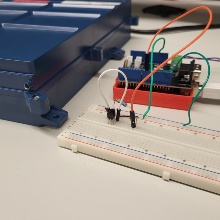Universities
- Technische Universität Berlin (TUB)
- Technische Universität Braunschweig (TU-BS)
- Technische Universität Hamburg (TUHH)
- TU München (TUM)
Timeframe
01.01.2020 - 30.03.2023
Project goal
The INTELWI project aims to design intelligent wings in the future that act autonomously as a subsystem of an aircraft and are aerodynamically more efficient overall.
However, the background of this project is to actively counteract the gust loads in cruise flight by means of combined aerodynamic control surfaces. Therefore, different research areas such as aerodynamics, system technology, but also intelligent sensor and actuator technology are investigated and applied. Project partners, both from industry and universities, are involved in the project network in order to be able to achieve good research results in all research focal points of the research project.
We are conducting research in INTELWI in the area of systems engineering. A Smart Digital Infrastructure (SDI) for future wings (a local avionics architecture) will be designed and demonstrated. Today's wings have no local intelligence except for sensors and actuators. Thus, full functional testing of the wing is not feasible until it is integrated into the aircraft. With the SDI, it should be possible in the future to realize the wing as an autonomous subsystem of the aircraft and to integrate it into the aircraft as a fully pre-tested component. Further, the wing periphery (e.g. sensor) could be automatically recognized by the adaptive platform approach to automatically configure different wing types. Further, local control and monitoring functions for different aircraft systems can be integrated to enable better exploitation of new multifunctional control surface concepts as well as customization. Accompanying, the safety and certifiability of such a local avionics platform will be evaluated.
Project start
INTELWI is realized within the framework of the aeronautical research project LuFo VI-1 (funded by BMWi) with several partners.





